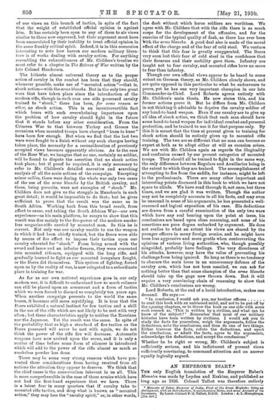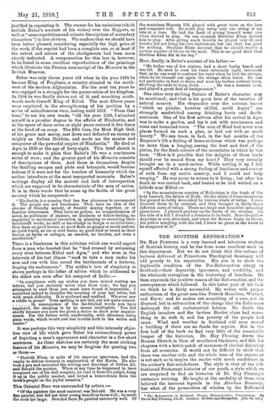AN EMPEROR'S DIARY.*
Tnz only English translation of the Emperor Baber's Memoirs was made by Leyden and Erskine, and published as long ago as 1826. Colonel Talbot was therefore entirely • Memoirs of Saber, Emperor of India, First of the Great Moghuls: being as Abridgment, with an Introduction, Suppiemsntarj Notes, and some Account of his Successors. By Lieut.-Colonel F. G. Talbot, D.S.O. London A. L. Humphreys. [21s. net.]
justified in reprinting it. The reason for his omissions (which include Baber's account of his victory over the Rajputs, as well as " some repetitions and minute descriptions of secondary characters") is less obvious. We confess that we should have been better pleased, considering especially the high price of the work, if the reprint had been a complete one, or at least if the extent and nature of the abridgments had been more clearly indicated. A. compensation for this loss is, however, to be found in some excellent reproductions of the paintings which illustrate the Persian manuscript of the Memoirs in the British Museum.
Baber was only eleven years old when in the year 1494 he became King of Ferghana, a country situated to the north- west of the modern Afghanistan. For the next ten years he was engaged in a struggle for the preservation of his kingdom.
In 1504 he was finally driven out of it, and marching south- wards made himself King of Kabul. The next fifteen years were employed in the strengthening of his position by a series of miscellaneous ware, lasting until 1519. " From that time," to use his own words, " till the year 1526, I attached myself in a peculiar degree to the affairs of Hindustan, and in the space of these seven or eight years entered it five times at the head of an army. The fifth time, the Most High God, of his grace and mercy, cast down and defeated an enemy so mighty as Sultan Ibrkhim, and made me the master and conqueror of the powerful empire of Hindustan." He died at Agra in 1530 at the age of forty-eight. This brief sketch is enough to make it plain that Baber's life was a continuous series of wars ; and the greater part of his Memoirs consists of descriptions of them. And these in themselves, despite the thrilling escapes and plots and betrayals, would become tedious if it were not for the touches of humanity which the author introduces at the most unexpected moments. Baber's writings display all the naivete and lack of introspection which are supposed to be characteristic of the man of action. It is in these words that he sums up the faults of the great country which he conquered:—
" Hindustan is a country that has few pleasures to recommend it. The people are not handsome. They have no idea of the charms of friendly society, of frankly mixing together, or of familiar intercourse. They have no genius, no comprehension of mind, no politeness of manner, no kindness or fellow-feeling, no ingenuity or mechanical invention in planning or executing their handicraft works, no skill or knowledge in design or architecture ; they have no good horses, no good flesh, no grapes or musk-melons, no good fruits, no ice or cold water, no good food or bread in their bazars, no baths or colleges, no candles, no torches, not even a candlestick."
There is a frankness in this criticism which one would expect from a man who boasted that he "had crossed by swimming every river between %libel and Agra," and who even in the intervals of his last illness "used to take a man under his arm and run with him round the battlements of a fortress, leaping the embrasures." The soldier's love of simplicity is shown perhaps in the letter of advice which he addressed to
his eldest son soon after his conquest of India:— "In compliance with my wishes you have indeed written me letters, but you certainly never read them over; for had you attempted to read them you must have found it impossible. I contrived indeed to decipher the meaning of your last letter, but with much difficulty. It is confused and crabbed. Whoever saw a riddle in prose? Your spelling is not bad, yet not quite correct. In consequence of the far-fetched words you have employed, the meaning is by no means intelligible. You fail chiefly because you have too great a desire to show your acquire- ments. For the future write unaffectedly, with clearness, using plain words, which would cost less trouble both to the writer and reader."
It was perhaps this very simplicity and this intensely objec- tive view of life which gave Baber his extraordinary power of depicting a man's appearance and character in a few short sentences. As these sketches are certainly the most striking feature of his Memoirs, we may be forgiven for quoting two
or three " Sheibilk Khan, in spite of his supreme ignorance, had the vanity to deliver lectures in explanation of the Koran. He also took a pen and corrected the writing and drawings of Sultan Ali, and Behzid the painter. When at any time he happened to have composed one of his dull couplets, he read it from the pulpit, hung it up in the public market, and levied a benevolence from the town's-people on the joyful occasion."
This Oriental Nero was surrounded by artists
"Of the painters the most eminent was Behzid. He was a very fine painter, but did not draw young beardless faces well ; he made the neck to large. Bearded faces fie painted extremely well. Of the musicians Hussain Udi played with great taste on the lute and composed well. He could play using only one string of his lute at a time. He had the fault of giving himself many airs when desired to play. On one occasion Sheibini Khan desired him to play. After giving much trouble he played very ill, and besides did not bring his own instrument, but one that was good for nothing. Sheibftni Khan directed that he should receive a certain number of blows on the neck. This is one good deed that Sheibini Khan did in his day."
Here, finally, is Baber's account of his father
"My father was of low stature, had a short bushy beard, and was fat. He used to wear his tunic extremely tight, insomuch that, as he was wont to contract his waist when he tied the strings, when he let himself out again the strings often burst. He was not particular in food or dress, and wore his turban without folds,
allowing the ends to hang down He was a humane man, and played a great deal at backgammon " One other very striking feature of Baber's character may be mentioned; and that is his great love of the beauties of natural scenery. His rhapsodies over the autumn leaves "which no painter, however skilful, could depict" are strangely sandwiched among drinking bouts and death- sentences. One of his first actions after his arrival in Agra was to make a garden, and lay it out with narcissuses and roses and tamarind-trees. " The men of Hind had never seen places formed on such a plan, or laid out with so much beauty." We can trace, in fact, in the last months of the Emperor's life a feeling of home-sickness which was perhaps no more than a longing, among the heat and dust of the plains, for the fresh colours of the mountains in which he was born. "How is it possible that the delights of those lands should ever be erased from my heart P They very recently brought me in a musk-melon. While cutting it up I felt myself affected with a strong feeling of loneliness and a sense of exile from my native country, and I could not help weeping." He was never to return to it living ; but after his death he was carried back, and buried as he had wished on a hillside near Kttbul:—
" In the mountainous country of Kaferistau is the tomb of tho holy Lamech, the father of Noah. On the skirts of these mountains the ground is richly diversified by various kinds of tulips. I once directed them to be counted, and they brought in thirty-three different sorts of tulips. There are large and beautiful spreading plane-trees. I planted gardens on the banks of the streams. On the side of a hill I directed a fountain to be built. Here the yellow Argwhan is very abundant, and when the flowers begin to bloom, the yellow mingling with the red, I know no place in the world to be compared to it."







































 Previous page
Previous page